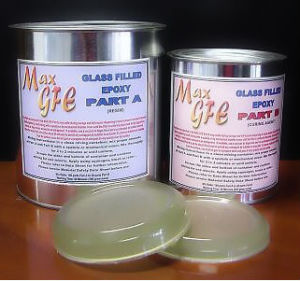Glass Filled Epoxy

For ordering and inquiries please call 877-403-8008.
Or visit our eBay Store, PolymerProducts.
Available Kit Sizes:
Description
MAX GFE is a two-component epoxy based resin that exhibits very high tensile strength properties. It is filled with milled fiberglass and the vacuum processed to remove any entrapped or incorporated air bubbles. The fiberglass filler dramatically improves the tensile strength, flexural modulus, thermally conductivity, abrasion resistance and surface hardness compared to an unfilled system. MAX GFE is easily mixed and poured into place. It is self-leveling and has low thixotropic gel-like consistency. Due to its thermally conductive filler a 400 gram mass can be mixed and casted without excessive heat due to exothermic heat generation.
MAX GFE is suitable for casting parts that require high tensile strength, dimensional stability and hardness.
MAX GFE can also be utilized as a potting compound that requires higher electrical insulative properties than standard potting compounds. It is suitable for use with silicone, polyurethane, steel, and wood molds. MAX GFE can be demolded after 36 hours room temperature cure or for a faster demold times, post cured under heat (30 minutes at 200oF) after it has gelled for 4 hours at room temperature allow to cool and de mold.
Physical and Mechanical Properties
Physical Properties
| Viscosity Part A | 15,800 cPs |
| Viscosity Part B | 250 cPs |
| Mixed Viscosity | 1250 cPs |
| Mix Ratio By Volume | 100 Parts A to 50 Parts B (2:1) |
| Mixed Density | 1.40 g/cc |
| Working Time: | 120 minutes (400 gram mass) |
| Peak Exotherm | 150oF max (400 gram mass) |
Mechanical Properties
| Shore Hardness: | 90 to 92 Shore D |
| Shrinkage Factor | <0.10 % |
| Compressive Strength: | 21,800 psi |
| Tensile Strength: | 13,900 psi |
| Tensile Elongation | 1.3% |
| Heat Distortion Temperature | 200oF |
| Thermal Conductivity | 0.682 W/m*K |
| Volume Resistivity | 2.58 x 1015 ohm · cm |
| Dielectric Constant | 4.41 |
| Dissipation Factor | 0.0113 |
| Surface Resistivity | 3.16 x 1016 ohm · cm |
| Service Temp. | 250 oF |
Chemical Resistance Performance
FULL IMMERSION at 30°C
MEASURED PERCENT CHANGE IN WEIGHT
| REAGENT | 3 days | 28 days |
| Deionized Water | 0.19 | 0.50 |
| Sea Water | 0.11 | 0.98 |
| Methanol | 5.63 | 6.41 |
| Ethanol | 2.28 | 4.28 |
| Toluene | 1.40 | 5.86 |
| Xylene | 1.04 | 2.05 |
| Butyl Cellosolve | 11.63 | 15.31 |
| MEK | 13.11 | Destroyed |
| 10% Lactic Acid | 0.81 | 1.42 |
| 10% Acetic Acid | 0.12 | 1.45 |
| 70% Sulfuric Acid | 0.18 | 0.94 |
| 50% Sodium Hydroxide | 0.04 | 0 |
| 10% Sodium Hypochlorite | 0.51 | 1.36 |
SPECIMEN CURE CYCLE 7 days @ 25ºC plus 1 hours at 100ºC
1 CUBIC INCH
Application and Usage
Before adding the curing agent, the fiberglass fillers incorporated in the MAX GFE Part A may settle during shipment or storage. It will require gentle stirring to disperse settling to insure proper cured performance.
Gently agitate by hand mixing with a spatula or by mechanical impeller mixer until the filler is uniformly dispersed. Pre-heating the resin to at least 120 degrees Fahrenheit will facilitate a much easier mixing.
Allow the resin to cool to room temperature before adding the curing agent.
Avoid aggressive mixing to help reduce excessive air entrapment.
If available, use a vacuum chamber to degas the resin or PART A component to accelerated air bubble removal.
Allow the mixed Part A to sit for about 30 minutes to permit any entrapped air bubbles to evacuate. To remove stubborn air bubbles from the surface, use a hot air gun or a hair dryer or a propane torch and pass it very quickly over the surface.